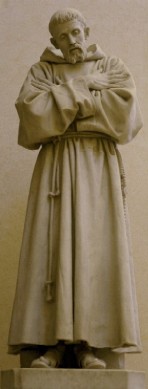
Today is my name's day, the feast of Saint Christopher. (In Italy, Name's Days used to be a bigger occasion than one's actual birthday.) (Remember, we have name's days, Saints have feast days. Hopefully one day we will all have our own feast days as well.)
Of course I often get the reply, "But today is Saint James' feast day, Saint Christopher is no longer a Saint." Yes, it is Saint James the Greater's feast day too. No, today is also Saint Christopher's commemoration as well. As with many of the changes after the Council, many are ignorant of what happened. It is true that Saint Christopher was removed from the liturgical calendar, but then, several other Saints were too, and a couple of Our Lady's titles as well. So, these are not actually celebrated in the liturgy, but they are still considered Saints and valid titles.
In fact, Saint Christopher is still listed in the most current 2004 Roman Martyrology. While historians can't prove the accuracy of his legend, they do still believe that there was a Martyr named Saint Christopher. Sadly, that means they have drastically shortened his entry in the Martyrology to:
"2. In Lycia, sancti Christophori, martyris."
"2. In Lycia, Saint Christopher, Martyr."
Please note: he is even listed as #2, right after Saint James the Greater, Apostle, whose feast would "trump" a memorial or a commemoration anyway.
The older Roman Martyrology had a bit more:
"In Lycia sancti Christophori Mártyris, qui, sub Decio, virgis férreis attritus, et a flammæ æstuántis incendio superna Christi virtúte servatus, ad ultimum, sagittárum ictibus confossus, cápitis obtruncatióne martyrium complevit."
"In Lycia, in the time of Decius, St. Christopher, martyr. Being scourged with iron rods, cast into the flames, from which he was saved by the power of Christ, and finally transfixed with arrows and beheaded, he completed his martyrdom."
I prefer the full legend myself:
"An ancient tradition concerning St. Christophorus relates: He was born in the land of Canaan, and was named Reprobus, that is Reprobate, for he was a barbarous heathen. In stature and strength he was a giant. Thinking no one his like in bodily vigor, he resolved to go forth in search of the mightiest master and serve him. In his wanderings, he met with a king who was praised as the most valorous man on earth. To him he offered his services and was accepted. The king was proud of his giant and kept him near his person. One day a minstrel visited the king's castle, and among the ballads he sung before the court was one on the power of Satan. At the mention of this name the king blessed himself, making the Sign of the Cross. Reprobus, wondering, asked him why he did that. The king replied: "When I make the sign, Satan has no power over me." Christophorus rejoined: "So thou fearest the power of Satan? Then he is mightier than thou, and I shall set and serve him."
Setting forth to seek Satan, he came into the wilderness. One dark night he met a band of wild fellows riding through the forest. It was Satan and his escort. Christophorus bravely accosted him, saying he wished to serve him. He was accepted. But soon he was convinced that his new master was not the mightiest on earth. For, one day, whilst approaching a crucifix by the wayside, Satan quickly took to flight, and the Saint asked him for the reason. Satan replied "That is the image of my greatest enemy, Who conquered me on the Cross. From Him I always flee." When Saint Christopher heard this, he left the devil, and went in search of Christ.
In his wanderings, he one day came to a hut hidden in the forest. At its door sat a venerable old man. The Saint addressed him, and in the course of the conversation. that ensued the old man told him that he was a hermit, and had left the world to serve Christ, the Lord of Heaven and earth.
"Thou art my man," cried the Saint! "Christ is He Whom I seek, for He is the strongest and the mightiest. Tell me where I can find Him."
The hermit then began instructing the giant about God and the Redeemer, and concluded by saying: "He who would serve Christ must offer himself entirely to Him, and do and suffer everything for His sake. His reward for this will be immense and will last forever." Christophorus now asked the hermit to allow him to remain, and to continue to instruct him. The hermit consented. When he was fully instructed, the hermit Baptized him. After his Baptism, a great change came over the giant. No longer proud of his great size and strength, he became meek and humble, and asked the hermit to assign to him some task by which he might serve God, his master. "For," said he, "I can not pray and fast; therefore I must serve God in some other way."
The hermit led him to a broad and swift river nearby, and said: "Here build thyself a hut, and when wanderers wish to cross the river, carry them over for the love of Christ." For there was no bridge across the river. Henceforth, day and night, whenever he was called, Reprobus faithfully performed the task assigned to him. One night he heard a child calling to be carried across the river. Quickly he rose, placed the child on his stout shoulder, took his staff and walked into the mighty current.
Arrived in midstream, the water rose higher and higher, and the child became heavier and heavier. "O child," he cried, "how heavy thou art! It seems I bear the weight of the world on my shoulder." And the child replied, "Right thou art. Thou bearest not only the world, but the Creator of Heaven and earth. I am Jesus Christ, thy King and Lord, and henceforth thou shalt be called Christophorus, that is, Christ-bearer. Arrived on yonder shore, plant thy staff in the ground, and in token of My power and might tomorrow it shall bear leaves and blossoms."
And the child disappeared. On reaching the other shore, Christophorus stuck his staff into the ground, and behold, it budded forth leaves and blossoms. Then, kneeling, he promised the Lord to serve Him ever faithfully. He kept his promise, and thenceforth became a zealous preacher of the Gospel, converting many to the Faith. On his missionary peregrinations he came also to Lycia, where, after his first sermon, eighteen thousand heathens requested Baptism.
When Emperor Decius heard of this, he sent a company of four hundred soldiers to capture Christophorus. To these he preached so convincingly, that they all asked for Baptism. Decius became enraged thereat and had him cast into prison. There he first treated him with great kindness, and surrounded him with every luxury to tempt him to sin, but in vain. Then he ordered him to be tortured in the most cruel manner, until he should deny the Faith. He was scourged, placed on plates of hot iron, boiling oil was poured over and fire was lighted under him. When all these torments did not accomplish their purpose, the soldiers were ordered to shoot him with arrows. This, too, having no effect, he was beheaded, on July 25, 254.
Two great Saints refer to the wonderful achievements of St. Christophorus. St. Ambrose mentions that this Saint converted forty-eight thousand souls to Christ. St. Vincent Ferrer declares that when the plague devastated Valencia, its destructive course was stayed through the intercession of St. Christophorus."
I find Fr. Z's comments on Saint Christopher rather amusing since at our parish I am often addressed by the servers as "Mister Chris."






2 comments:
Happy Name's Day!!
It's not my name day, but I have learnt so much about the faith researching what I call my patron saints, James and Christopher, since I was born this day! Indeed I celebrate namedays with my CCD students to inculcate some excitement - none of them know when we going to break for a wee party and it'll be their turn for a gift. Even if I risk an occassion of pride, return attendance in my classes is one of the highest at the parish - kids love learning about how special their forebears in the faith are, and its no jaunt finding blessed models for some of the inovative names parents come up with these days!
Congratulations, anyhow , and many happy returns of the day!
Post a Comment